|
|
|
Sort Order |
|
|
|
Items / Page
|
|
|
|
|
|
|
| Srl | Item |
| 1 |
ID:
186300
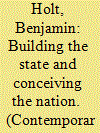

|
|
|
|
|
| Summary/Abstract |
In 1966 the Mizo National Front (MNF) instigated a separatist conflict against the Indian state. This article argues that an environment conducive for separatist insurgency was created by the early 1960s in the Mizo Hills, a direct result of problematic state- and nation- building practices. First, there was an inability to initiate a successful state-building drive to overcome deep-seated challenges bestowed by colonial rule. Second, the friction between regional and national conceptions of identity was not resolved. This argument exploits a clear research gap. Currently there is a convincing explanation for the MNF’s transition towards civil war between 1961-66. Yet, explaining the structural factors which created an environment conducive for separatist conflict remains elusive. This article plugs that gap, through archive-led historical analysis. In the process, it provides wider insights for conflict dynamics in India’s northeast and raises broader questions about interdisciplinary research in the subfield of intrastate conflict.
|
|
|
|
|
|
|
|
|
|
|
|
|
|
|
|
| 2 |
ID:
186305
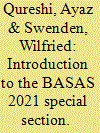

|
|
|
|
|
| Summary/Abstract |
This special section is dedicated to the BASAS conference 2021. The conference coincided with the devastating second wave of Covid-19 in India, which started in March and peaked in May 2021. Case numbers and mortality in South Asian countries were very high and their health systems too struggled to keep up with these unprecedented times. As governments across South Asia appeared to fail their populations, a sense of crisis was shared by conference participants, many of whom were personally affected by this wave. This conference was unique in that it took place after a two-year gap due to the Covid-19 pandemic and in that it was the first fully online BASAS conference. The papers in the special section draw attention to significant areas of research in South Asia.
|
|
|
|
|
|
|
|
|
|
|
|
|
|
|
|
| 3 |
ID:
186301
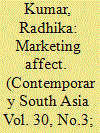

|
|
|
|
|
| Summary/Abstract |
Electoral campaigning in India is now effectively multi-modal and inhabits both the virtual and the real sphere. However, tools and techniques of campaigning vary across parties. The two parties that this paper focuses on, the BJP and the AAP, are known for running highly organized campaigns marked by their intensity and voter reach. The paper looks at the specific case of the Delhi assembly elections of 2015 and 2020 to compare strategies and the election campaign of the two parties. The paper argues that while the campaign of both parties was methodical and micro-managed, the selection of electoral issues and customization of the campaign to the addressed audience varied. The parties are comparable in terms of being leader centric, tending towards the personalization of politics, and both conducted professionalized campaigns, yet the political marketing of the element of affect differed. To demonstrate this, the paper firstly draws on literature in the field of political communication to illustrate the role of emotions, or the aspect of affect, in an electoral campaign. Secondly, through a perusal of media reportage and analysis, the paper traces the process by which personalization was manifested and how the narrative of affect came to be framed in the election campaign.
|
|
|
|
|
|
|
|
|
|
|
|
|
|
|
|
| 4 |
ID:
186306


|
|
|
|
|
| Summary/Abstract |
Gig work has been considered ‘disruptive’ by platforms for its market efficiency, but concerns around precarity of work in the Global North have been raised since the early 2000s. In India, the dominance of informal work makes precarious work the norm, thus begging the question, does gig work disrupt or extend this precarity in new directions? Based on in-depth interviews with gig workers in India, this paper explores the relations between the informal economy and platform-based gig work in India with a focus on the experiences of workers. The paper argues that, much like informal work, gig workers bear a disproportionate risk, with their work regulated by social identities of caste and gender that determine entry and exit from work. The digital mediation of work in the gig economy extends such existing social relations of informal work into gig work, especially as labour remains deregulated by the Indian state. Through this, India points us in the direction of what the future of work may be for workers in a global digitised gig economy where such precarious and insecure work is now increasingly entrenched.
|
|
|
|
|
|
|
|
|
|
|
|
|
|
|
|
| 5 |
ID:
186308
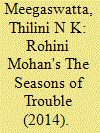

|
|
|
|
|
| Summary/Abstract |
The protracted armed conflict in Sri Lanka (1983–2009) has had a significant impact on the social fabric of the country. The Tamil community – the women especially – bore the brunt of the traumatic spill-over of decades of warfare that brutalised all areas of life, especially in the North. With the belief that narrative literature on war captures the complex ways in which gender, war, and peace interact and impact configurations of the female gender in turbulent war-torn and post-war societies, this paper critically reads Rohini Mohan's The Seasons of Trouble (2014), a non-fiction narrative of the life stories of three individuals that lay claim to ‘truth’ and therefore is placed in a strong position in relation to collective memory, archive, and history. The critical content analysis from a feminist theoretical standpoint conveys how the trajectories of Tamil women caught in Sri Lanka's war shine a light on the ways in which dominant configurations of war and peace construct the female gender identity in specific ways and thereby shape the way women are framed in war-torn and post-war societies with tangible implications on the lived realities of Tamil women in Sri Lanka.
|
|
|
|
|
|
|
|
|
|
|
|
|
|
|
|
| 6 |
ID:
186303
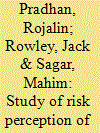

|
|
|
|
|
| Summary/Abstract |
Due to the ever-increasing use of mobile communications in India, health risks associated with exposure to radiofrequency electromagnetic field (RF-EMF) transmitted by mobile phones and base stations has become the focus of research. Internationally, there have been numerous studies on RF-EMF risk perception, but this issue is scarcely addressed in India. The present study evaluates the level of risk perception of Indians associated with RF-EMF exposure from mobile phones and base stations and assesses the underlying reasons for their concerns. We conducted a qualitative study on a small group of Indians (n = 25) from varied socioeconomic backgrounds, followed by a large-scale population (n = 500) survey to identify the primary issues of concern. The results show that many participants, irrespective of their social group, have a positive attitude towards mobile phones and are willing to accept the risks of using them, but are against the installation of base stations. Our study confirms that lack of knowledge about mobile communications technology, health concerns about mobile phones and base stations, community concern regarding base station deployment and media influence have a significant impact on risk perception among Indians. Carefully planned communication techniques are required to decrease risk perceptions and increase acceptance of mobile communications infrastructure.
|
|
|
|
|
|
|
|
|
|
|
|
|
|
|
|
| 7 |
ID:
186307
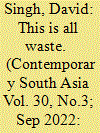

|
|
|
|
|
| Summary/Abstract |
Renewables are imagined in India around features of ‘greenness’ and ‘cleanness’ and are presented as the modern pathway towards sustainable development and unlimited growth. But this shining story entails problematic land politics and the related (un)making of space for capital accumulation: previous property regimes and land uses are erased while a new set of land technologies and territorial rules legitimates land dispossession and the private takeover of commons. Wind infrastructures are specifically targeting (common) lands categorized as ‘deserted’, ‘empty’ and ‘waste’, and subaltern groups (tribal, pastoral and Dalit communities) whose livelihood practices have been historically described as ‘unproductive’ and ‘backward’. These both violent and discursive logics of (neo)colonial and green energy land politics are mediated and fixed to the ground levels by powerful (land) brokers, contractors, wind companies’ land teams and political mediators who embark land on its tortuous, bureaucratic and yet material journey towards clearing, cleaning and holding value. This article offers perspectives from political geography and critical agrarian studies to understand the territorial process, the persistence of class-caste relations and the legacy of coloniality underlying the land politics of green energy development in borderland India.
|
|
|
|
|
|
|
|
|
|
|
|
|
|
|
|
| 8 |
ID:
186302
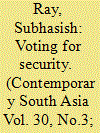

|
|
|
|
|
| Summary/Abstract |
Do perceptions of insecurity from politically motivated violence affect the decision of poor voters to re-elect incumbents in Indian elections? This article examines this question in the empirical context of the Maoist-affected Junglemahal region in the state of West Bengal in eastern India. Exploiting original survey data collected in 38 Maoist-affected villages in Junglemahal prior to the 2019 Lok Sabha election, I show that respondents (a) were able to discriminate between politically motivated violence and other governance-related issues, (b) were more inclined to vote for the incumbent the greater the importance attached to the provision of public goods, but (c) were less inclined to vote for the incumbent the greater the importance attached to politically motivated violence. In auxiliary tests, I find that the effect of the perceived threat from politically motivated violence was mediated by feelings of fear, anger, and worry about the general direction in which the state was going. I also present evidence showing a positive relationship between the level of campaign contact by the opposition party and the level of negative emotions experienced by voters.
|
|
|
|
|
|
|
|
|
|
|
|
|
|
|
|
| 9 |
ID:
186304
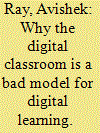

|
|
|
|
|
| Summary/Abstract |
The pandemic has compelled educational institutes across the world to hastily adopt, adapt and cope with digital learning by developing ‘digital classrooms’, virtual learning environments replete with sophisticated technological features. The eagerness of the intent to ramp up technological infrastructures, however, is not reflected in the rethinking or redesigning of pedagogies for digital learning. Technocratic ambitions often have very little, if anything, to do with pedagogy. Moreover, the digital classroom is ‘global’ by design, and the ethnocentric framework wrought upon by such designs impedes the decolonizing of the curriculum. It depletes local pedagogic cultures: local histories and cultures, political and moral economies. This article argues that imagining the digital classroom a-temporally and a-culturally, typically from a technocratic point of view, signals a tryst with (techo-)orientalism in its new avatar.
|
|
|
|
|
|
|
|
|
|
|
|
|
|
|
|
|
|
|
|
|